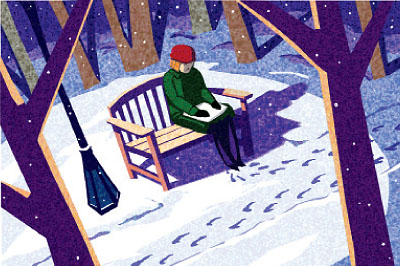
The Packet— In death, the chance to know a Bates life

Three times a year, I receive a packet from the editor of this magazine, a packet that no one else receives. In it are the stories of 50 or 60 people, all part of the Bates community in some way: alumni, faculty, staff. But they are united by more than being part of this community. They have all recently died.
It is my job to read through this packet and write obituaries for this magazine. I read through the factual material that the College records: academic majors and athletic awards, postgraduate degrees and marriages or divorces, places of employment and number of children. I read the newspaper articles and Class Notes and other bits of information the College has collected over the years. I search the Internet for any additional material I can find.
And then I try to read between the lines, try to figure out who this person was, what Bates meant to them, and what they meant to Bates. It is my job to capture all of that in just a few paragraphs.
I picture them hurrying across the Quad to class, watching the Hathorn clock tick off another minute. I see them climbing the stairs in Parker or Roger Bill or Rand. I know that each of them sat beneath the elms at least once during their years at Bates, and walked down College Street in search of off-campus sustenance. I wonder if any of them lived in the same rooms I did in Page or Mitchell or Rand.
It always surprises me to read about the different lives people with a degree from Bates lead. A math major works on the Manhattan Project. A French major ends up doing disaster relief for the Red Cross. The big jock is moved to write poetry. We walked the same path to shake hands with the College president and receive our degree, but after that our common path led us in thousands of directions.
Some of us lead lives of quiet contentment on a farm in rural Maine only a few miles from where we were born. Others thrive on the pulse of Wall Street. A teacher who never married amasses a small fortune, which he wills to Bates for scholarships. Another amasses a small army of children and devotes her life to volunteering at their schools.
Usually, there are people whom I wish I had known, people who shared my interests or who did something so interesting that it sparks my curiosity. I have to remind myself that I have lost the opportunity to learn from him or her, or to share our interests. I wonder if our paths ever crossed.
It is my job to set aside my ruminations and concentrate on summarizing a life in a way that is meaningful to the Bates community and to the deceased’s family.
The hardest obituaries to write are those of people I knew, people with whom I sat under the elms or climbed the stairs, or walked down College Street. I’ve learned to write those first, before I am paralyzed by their deaths.
Almost as hard to write are those about people for whom I have little or no information. Sometimes I gather my courage and call one of the deceased’s survivors. I hastily assure him or her that I’m not asking for money, that instead I am asking for some details about the person they loved. The call then turns into one of joy and relief, an opportunity for the bereaved to talk again about someone they have lost.
Only once have I been rebuffed, by a man’s mother. I knew the deceased had been a gardener and a cook, and that he was predeceased by his dear friend, a man. There was a hint of a hidden life there, but his mother refused to acknowledge it. And that is all that I have: only the barest details. I stare at the two or three lines I have managed to extract from those details, and only reluctantly move on.
But I have found that usually it doesn’t matter how much material I have about a person. It is the details in the material that matter. A pile of newspaper clippings gives me a fact or two, but a note scribbled in the deceased’s hand — “Now that the kids are grown, I have finally learned to sail” — tells me so much about the person.
Another packet just arrived. I sigh in relief that there is no one I know. But soon I will come to understand a bit about all of the people whose lives I will summarize, and I will find a few I wish I had known.
It is my job to write these obituaries. And it is my privilege.
By Christine Terp Madsen ’73, illustration by Marty Braun
Chris Madsen ’73 is a writer who lives in Olympia, Wash., but dreams of Maine.



